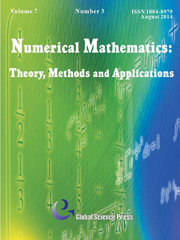Article contents
A Priori Error Estimate of Splitting Positive Definite Mixed Finite Element Method for Parabolic Optimal Control Problems
Published online by Cambridge University Press: 24 May 2016
Abstract
In this paper, we propose a splitting positive definite mixed finite element method for the approximation of convex optimal control problems governed by linear parabolic equations, where the primal state variable y and its flux σ are approximated simultaneously. By using the first order necessary and sufficient optimality conditions for the optimization problem, we derive another pair of adjoint state variables z and ω, and also a variational inequality for the control variable u is derived. As we can see the two resulting systems for the unknown state variable y and its flux σ are splitting, and both symmetric and positive definite. Besides, the corresponding adjoint states z and ω are also decoupled, and they both lead to symmetric and positive definite linear systems. We give some a priori error estimates for the discretization of the states, adjoint states and control, where Ladyzhenkaya-Babuska-Brezzi consistency condition is not necessary for the approximation of the state variable y and its flux σ. Finally, numerical experiments are given to show the efficiency and reliability of the splitting positive definite mixed finite element method.
Keywords
Information
- Type
- Research Article
- Information
- Numerical Mathematics: Theory, Methods and Applications , Volume 9 , Issue 2 , May 2016 , pp. 215 - 238
- Copyright
- Copyright © Global-Science Press 2016
References
- 3
- Cited by

